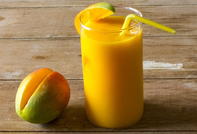
Freshly-pressed juice is rich in a variety of immune-boosting agents, but processing such as chilling, blending and pasteurisation can lead to changes in nutrients, colour and flavour with a subsequent reduction in the nutritional value of the product.
Juice as Medicine
The ‘Gerson Therapy’ is a therapy developed by Dr Max Gerson in 1930, first to treat his own headaches and later used to treat cancer patients. It is a natural treatment that activates the body’s healing ability through a plant-based diet of raw juices, natural supplements and coffee enemas. Juices are taken hourly for up to 13 hours per day and flood the body with easy-to-absorb vitamins and enzymes.
Other studies have also confirmed the healing power of fresh juice. Patients with peptic ulcers were treated with fresh cabbage juice, which contains an anti-peptic ulcer factor. This factor (vitamin U) affected healing in 7.3 days compared to 42 days for the control group. Vitamin U evaporates within minutes and needs to be consumed immediately.
Ayurvedic practitioners use fruit, vegetable and herb juices mixed with milk and honey to create juice remedies. Orange and lime juice mixed with salt prevent fatigue, and beetroot or grape juice is believed to ‘restore’ the blood. Onion and radishes are especially revered in the Ayurvedic healing traditions. For example, radish juice is used to treat stomach aches and cleanse the kidneys to prevent gallstones.
Benefits of Juice
Nutrients in juice include plant-purified water, vitamins, enzymes, minerals, proteins, chlorophyll and phytonutrients such as carotene and lycopene, both colourants found in red and orange fruits and vegetables.
Juice helps the body to hydrate - water helps the body process carbohydrates and boost metabolism. Fresh juices are rich in soluble fibre, which supports good bacterial growth in the digestive tract and contains antioxidants. Antioxidants protect against damage caused by unstable molecules that naturally occur in the body. Dark-coloured fruit and vegetables - e.g. blueberries and beetroot - contain more antioxidants.
Freshly-squeezed juice, drunk as soon as possible after processing, is the healthiest option and have more vitamins, minerals and other nutritional compounds than bottled or pre-packed fruit juice. These most often contain preservatives or are processed in a way that reduces the nutritional value of the juice.
Juice and Sugar
According to the South African Fruit Juice Association (SAFJA) the natural sugar content of fruit is between 8% and 12%, but may vary depending on the type of fruit and ripeness. Fruit high in sugar includes dates, figs, grapes, mangoes and pomegranates.
Often sugar may be added to sweeten fruit juices in the form of sucrose syrup. This is a cheaper option than blending with sweet natural juices such as apple, pear or grape juice. Fructose is a natural sugar found in fruit and can help normalize blood sugar levels.
For people sensitive to sugar intake, it is often recommended to dilute fruit juice with water, while diabetics should consult their health practitioner for advice on how to benefit most from the intake of fruit and fruit juice.
By Marinda Louw